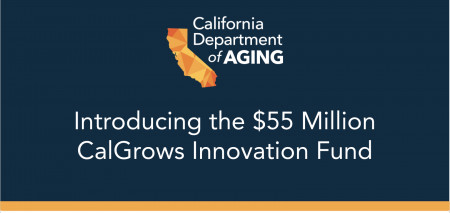Applications Open for the $55 Million CalGrows Innovation Fund to Support the Expansion of the Home and Community-Based Direct Care Workforce

SACRAMENTO, Calif., November 16, 2022 (Newswire.com) - The California Department of Aging today announced the launch of the $55 Million CalGrows Innovation Fund, which is accepting applications from organizations to improve training and offer incentives for the direct care Home and Community-Based Services (HCBS) workforce and unpaid family and friend caregivers. Applications will be accepted through Dec. 2, 2022, at CalGrows.org.
In the coming years, California will face a labor shortage of up to 3.2 million paid direct care workers. The California Master Plan for Aging, in its fourth bold goal, "Caregiving That Works," is seeking to support California's unpaid family or friend caregivers, as well as the paid unlicensed direct care workforce. Part of the fourth goal is the launch of the Direct Care Workforce Training and Stipends Program: CalGrows. The Program will incentivize, support, and fund career pathways for direct care workers and family and friend caregivers.
The CalGrows Innovation Fund is accepting applications through Dec. 2, 2022, from diverse programs to train and incentivize direct care skills development, increase retention and job satisfaction, and provide career advancement opportunities for home and community-based direct care workers such as home care aides, care managers, dementia care specialists, activities coordinators, and many more. Organizations and consortiums with a presence in California that contribute to a culturally responsive workforce that serves the diversity of California's aging and disabled populations should submit their innovative training ideas.
"Our goal is that the CalGrows program will provide the foundation for many positive outcomes for the direct care worker, starting with the training that's part of the CalGrows Innovation Fund," said California Department of Aging Director Susan DeMarois. "Improving the training available to direct care workers and family caregivers will help them deliver high-quality care to older adults and people with disabilities, ensuring improved health and well-being for all. Those improvements ultimately benefit all Californians."
"The CalGrows Innovation Fund phase of The Master Plan for Aging is an important and exciting step in the greater blueprint to build a California for All," said Secretary Mark Ghaly, California Health and Human Services Agency, who leads the Master Plan Cabinet Work Group. "We encourage all those developing innovative training and incentives programs for home and community-based direct care workers to apply for CalGrows funding."
The CalGrows Innovation Fund is administered by Cell-Ed, a global social enterprise. Important upcoming dates include:
- Applications Live: Nov. 7, 2022
- Q&A Webinar: Nov. 18, 2022
- Deadline for Applications: Dec. 2, 2022
- Announce Awards by Jan. 31, 2023
- Funded grant programs will begin no later than March 2023
The CalGrows Innovation Fund launch kicks off phase one of the CalGrows program. Phase 2 will feature training sessions and an incentive program for direct care workers starting in the first quarter of 2023. Please check the CalGrows.org website and register for regular updates.
About The California Department of Aging
Under the umbrella of the California Health and Human Services Agency, the California Department of Aging (CDA) administers programs that serve older adults, adults with disabilities, family caregivers, and residents in long-term care facilities throughout the State. These programs are funded through the federal Older Americans Act, the Older Californians Act, and the Medi-Cal program. To promote the Department's goal of every Californian having the opportunity to enjoy wellness, longevity, and quality of life in strong healthy communities, CDA actively collaborates with many other State departments (and other entities) on transportation, housing and accessibility, emergency preparedness and response, wellness and nutrition, falls and injury prevention, improving services to persons with dementia, reducing fraud and abuse, and many other issues. To learn more, visit www.aging.ca.gov.
###
Source: California Department of Aging (CDA)